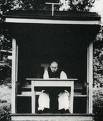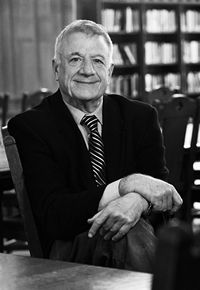 I am chairing another panel presentation (this week at the International Leadership Assocation [ILA] Conference in Chicago) on African Models of Leadership entitled, "Developments in African Leadership: A Renaissance of Values-based Leadership Approaches", with Drs. Jeff Hale, Kathleen Patterson and Bruce Winston. Here follows an abstract of the presentation:
I am chairing another panel presentation (this week at the International Leadership Assocation [ILA] Conference in Chicago) on African Models of Leadership entitled, "Developments in African Leadership: A Renaissance of Values-based Leadership Approaches", with Drs. Jeff Hale, Kathleen Patterson and Bruce Winston. Here follows an abstract of the presentation:Monday, October 30, 2006
Developments in African Leadership
 I am chairing another panel presentation (this week at the International Leadership Assocation [ILA] Conference in Chicago) on African Models of Leadership entitled, "Developments in African Leadership: A Renaissance of Values-based Leadership Approaches", with Drs. Jeff Hale, Kathleen Patterson and Bruce Winston. Here follows an abstract of the presentation:
I am chairing another panel presentation (this week at the International Leadership Assocation [ILA] Conference in Chicago) on African Models of Leadership entitled, "Developments in African Leadership: A Renaissance of Values-based Leadership Approaches", with Drs. Jeff Hale, Kathleen Patterson and Bruce Winston. Here follows an abstract of the presentation:Towards an Understanding of Leadership and Spirituality
 I am chairing a panel entitled "Towards an Understanding of Leadership and Spirituality", this week at the International Leadership Association (ILA) Conference in Chicago, with Drs. Diane Chandler, Michael Hartsfield and Karin Klenke. Here is an abstract of the session:
I am chairing a panel entitled "Towards an Understanding of Leadership and Spirituality", this week at the International Leadership Association (ILA) Conference in Chicago, with Drs. Diane Chandler, Michael Hartsfield and Karin Klenke. Here is an abstract of the session:Sunday, October 29, 2006
The Deceit of Pride
 Pride is deceitful. A telling old Jewish joke shows the changing face of pride. In the village synagogue, during the High Holidays, the rabbi prostrates himself on the floor, saying, "God, before You I am nothing." Immediately the richest man in town prostrates himself on the floor, saying, "God, before You I am nothing." Right after that the town beggar prostrates himself on the floor, saying, "God, before You I am nothing." The rich man whispers to the rabbi,"Look who thinks he's nothing."
Pride is deceitful. A telling old Jewish joke shows the changing face of pride. In the village synagogue, during the High Holidays, the rabbi prostrates himself on the floor, saying, "God, before You I am nothing." Immediately the richest man in town prostrates himself on the floor, saying, "God, before You I am nothing." Right after that the town beggar prostrates himself on the floor, saying, "God, before You I am nothing." The rich man whispers to the rabbi,"Look who thinks he's nothing."Dr. Paul Wong, Professor at Western Trinity University proposes the following practices in the pursuit of humilty, practices that I think translates very well to organizational leadership behavior:
* Acknowledging our wrong doing
* Receiving correction and feedback graciously
* Refraining from criticizing others
* Forgiving others who have wronged us
* Apologizing to others who have been wronged by us
* Enduring unfair treatments with patience and a forgiving spirit
* Thinking and speaking about the good things of other people
* Rejoicing over other people's success
* Counting our blessings for everything, good and bad
* Seeking opportunities to serve others
* Willing to remain anonymous in helping others
* Showing gratitude for our successes
* Giving due credit to others for our successes
* Treating success as a responsibility to do more for others
* Willing to learn from our failures
* Assuming responsibility for our failures
* Accepting our limitations and circumstances
* Accepting social reality of discrimination and prejudice
* Treating all people with respect regardless of their social status
* Enjoying the lowly status of being an outsider and a nobody
Hellen Keller, the great teacher, once declared: "I long to accomplish a great and noble task, but it is my chief duty to accomplish humble tasks as though they were great and noble. The world is moved along, not only by the mighty shoves of its heroes, but also by the aggregate of the tiny pushes of each honest worker. "
Picture:Kendell Geers 2006. Seven Deadly Sins (Pride). Ultra-violet Neon Sculpture. Stephen Friedman Gallery, London.
Further Reading:
Here is a link to Professor Wong's essay on humility:
http://www.meaning.ca/articles/presidents_column/humility_nov03.htm
Thursday, October 26, 2006
Lead as by the Spirit
 I read the following, this morning, from the wonderful "Counsels of Light and Love" of the 16th century Spanish Christian leaders, John of the Cross:
I read the following, this morning, from the wonderful "Counsels of Light and Love" of the 16th century Spanish Christian leaders, John of the Cross:Wednesday, October 25, 2006
Prayer as Revolt
 I received the quote below from Thomas Merton's great book "Conjectures of a Guilty Bystander" today through a listserve that I am registered with. I like the idea of prayer as revolt. How do we change sick organizations? Merton proposes that it starts with prayer:
I received the quote below from Thomas Merton's great book "Conjectures of a Guilty Bystander" today through a listserve that I am registered with. I like the idea of prayer as revolt. How do we change sick organizations? Merton proposes that it starts with prayer:Tuesday, October 24, 2006
New Edition of Leadership Advance
The Power of Humble Love

In the Eastern Orthodox tradition at its best, the spiritual father has always sought to avoid any kind of constraint and spiritual violence in his relations with his disciple. If, under the guidance of the Spirit, he speaks and acts with authority, it is with the authority of humble love. The words of Abba Zosima in The Brothers Karamazov express an essential aspect of spiritual fatherhood: "At some ideas you stand perplexed, especially at the sight of men's sin, uncertain whether to combat it by force or by humble love. Always decide, 'I will combat it by humble love.' If you make up your mind about that once and for all, you can conquer the whole world. Loving humility is a terrible force; it is the strongest of all things and there is nothing like it."
Monday, October 23, 2006
Humility and Christian Scholarship

Friday, October 20, 2006
Leadership free from the desire to dominate

Amma Theodora said, 'Let us strive to enter by the narrow gate, Just as the trees, if they have not stood before the winter's storms cannot bear fruit, so it is with us; this present age is a storm and it is only through many trials and temptations that we can obtain an inheritance in the kingdom of heaven.' The same Amma said that a teacher ought to be a stranger to the desire for domination, vain-glory, and pride; one should not be able to fool him by flattery, nor blind him by gifts, nor conquer him by the stomach, nor dominate him by anger; but he should be patient, gentle and humble as far as possible; he must be tested and without partisanship, full of concern, and a lover of souls.
Thursday, October 19, 2006
Monday, October 16, 2006
Socio-Rhetorical Criticism and the Promise it Holds for Leadership Study

Friday, October 13, 2006
Common Humanity in African Leadership
 I am preparing a paper on emerging African approaches to humane leadership as well as finalizing the itinerary for an up-coming trip to South Africa, and thus have been thinking about the promise that a humane approach to leadership (such as the African philosophy of Ubuntu) holds for the re-building of the continent.
I am preparing a paper on emerging African approaches to humane leadership as well as finalizing the itinerary for an up-coming trip to South Africa, and thus have been thinking about the promise that a humane approach to leadership (such as the African philosophy of Ubuntu) holds for the re-building of the continent.Louw (2003) explains the basic premise of ubuntu: “Ubuntu serves as the spiritual foundation of African societies. It is a unifying vision or world view enshrined in the Zulu maxim 'umuntu ngumuntu ngabantu', i.e. ‘a person is a person through other persons’.” The birth of the new democratic nation of South Africa opens the door for a rediscovery of the possibilities of a humane approach to leadership. Maphisa (2004), writing on the eve of the birth of the new democracy says: “South Africans are slowly re-discovering their common humanity. Gone are the days when people were stripped of their dignity (ubuntu) through harsh laws. Gone are the days when people had to use ubulwane [i.e. animal like behaviour] to uphold or reinforce those laws. I suggest that the transformation of an apartheid South Africa into a democracy is a re-discovery of ubuntu”.
There is a similar approach in Paul's letter to the Phillipians (2:2-3) that is rooted in a mimetic devotion of Jesus as the Son of God. He writes: "Let nothing be done through selfish ambition or conceit, but in lowliness of mind let each esteem others better than himself. Let each of you look out not only for his own interests, but also for the interests of others.”
Further Reading:
Louw, D J 2003. Ubuntu: An African Assessment of the Religious Other. Unpublished paper: University of the North.
Maphisa, Sisho. 1994. Man in constant search of Ubuntu: a dramatist's obsession. Pretoria: Ubuntu School of Philosophy.
Thursday, October 12, 2006
The Devotional Discipline of Study
 The Biblical, devotional discipline of study has been one on of the "lost" disciplines of recent Evangelical Christianity. There seems to be a hesitancy to think of the mind as an avenue to transformation. Donald Whitney said it best: “Why do we seem to think we must choose between the two? Why do many Christians live as though they've been told, ‘Choose you this day whom you will serve: scholarship or devotion’? I maintain that a Biblically balanced Christian has both a full head and a full heart, radiating both spiritual light and heat.”
The Biblical, devotional discipline of study has been one on of the "lost" disciplines of recent Evangelical Christianity. There seems to be a hesitancy to think of the mind as an avenue to transformation. Donald Whitney said it best: “Why do we seem to think we must choose between the two? Why do many Christians live as though they've been told, ‘Choose you this day whom you will serve: scholarship or devotion’? I maintain that a Biblically balanced Christian has both a full head and a full heart, radiating both spiritual light and heat.”The wisdom of the ages would suggest that we need to consider study as worship, as an avenue in which God brings transformation to our inner and outer worlds. Karl Barth points us in this direction: “In prayer, theological work is the inner, spiritual and vertically directed motion of man; while I study, although similarly external, it runs in a horizontal direction. It is also an intellectual, and physical, if not fleshly, movement. Theological work can be done only in the indissoluble unity of prayer and study. Prayer without study would be empty. Study without prayer would be blind.”
May we recover a Biblical approach to study that will aid us in the re-discovery of a humble, authentic and transforming approach to leadership.
Wednesday, October 11, 2006
The Evangelical Mind Revisited
 I, together with my colleagues at Regent University, am meeting Professor Alan Wolfe, later today, to discuss his opinion article entitled; "The Evangelical Mind Revisited."Alan Wolfe is a professor of political science and director of the Boisi Center for Religion and American Public Life at Boston College.
I, together with my colleagues at Regent University, am meeting Professor Alan Wolfe, later today, to discuss his opinion article entitled; "The Evangelical Mind Revisited."Alan Wolfe is a professor of political science and director of the Boisi Center for Religion and American Public Life at Boston College.Professor Wolfe writes:
"One other significant challenge faces evangelical institutions determined to take seriously the life of the mind: they have to make a decision about truth. This ought not to be a problem for them, since serious Christians do not think that their views about God's existence are just matters of opinion. They are convinced that claims of faith are truth claims. Indeed, one of the main gripes conservative Christians have about secularists is their presumed moral relativism, their unwillingness to say flat out that certain things are true (or good or just), and other things are not."
I welcome the oppertunity to enter into discussion with Professor Wolfe and others on these thoughts. I am convinced that a strong, vibrant faith is marked by the willingness to enter into honest, humble and yet rigorous debate about what we perceive to be [T]rue. Truth, if it indeed is true, can hold its own ground.
I am reminded of the words of Caleb Colton (writing of the Biblical devotional discipline of study):
“He that studies only men, will get the body of knowledge without the soul; and he that studies only books, the soul without the body. He that, to what he sees, adds observation, and to what he reads, reflection, is in the right road to knowledge, provided that in scrutinizing the hearts of others, he neglects not his own...”
May our pursuit of understanding reality and He who is "ultimate Real" lead us to the scrutiny of our own hearts and renew our commitment to follow Him, who is the Way, the Truth and the Life (see John 14:6).
Here is a link to Professor Wolfe's article:
http://www.carnegiefoundation.org/change/sub.asp?key=98&subkey=1119
Tuesday, October 10, 2006
New Publication in Christian Spirituality Research
 We recently had the joy of hosting Professor Celia Kourie, Professor and author in Christian Spirituality from the University of South Africa and St. Augustine's College. Celia recently co-edited a new publication on research approaches in Christian Spirituality. This publication is the eigth supplemtum to the Acta Theologica Journal. The book is entitled: "The Spirit that moves: Orientation and Issues in Spirituality." (ISBN: 0-86886-713-6). It is worthwhile getting. The research approaches and orientations mentioned in this publication opens many doors for scholars exploring authentic Christian spirituality in leadership.
We recently had the joy of hosting Professor Celia Kourie, Professor and author in Christian Spirituality from the University of South Africa and St. Augustine's College. Celia recently co-edited a new publication on research approaches in Christian Spirituality. This publication is the eigth supplemtum to the Acta Theologica Journal. The book is entitled: "The Spirit that moves: Orientation and Issues in Spirituality." (ISBN: 0-86886-713-6). It is worthwhile getting. The research approaches and orientations mentioned in this publication opens many doors for scholars exploring authentic Christian spirituality in leadership.Kourie writes about the promise that the renewed interest in spirituality brings (2006:35):
" We are witnessing a renewal of interest in perhaps what is one of the oldest traditions in human history, namely, the transmission of spiritual wisdom...It is my contention that the 'turn' to spirituality, both general and academic, will help bring about an ecumenical transformation of consciousness, which will elucidate the many-faceted spendour and diverse ways in which to discover Ultimate Reality."
Source:
De Villiers, P.G.R; Kourie, C.E.T; and Lombaard, C. 2006. The Spirit that moves: Orientation and Issues in Spirituality. Acta Theologica Supplementum 8.
Monday, October 09, 2006
Research Avenues in Spirituality and Leadership
 Until recently, there has been a large gap in the literature and research that explore the spirituality of leadership. One exception is the theory of spiritual leadership developed by Fry (2003). One reason for the gap lies in the lack of consensus on the definition and description of the dynamics of spiritual formation as it relates to effective leadership development. A further concern is that the majority of curricula that deal with spirituality and leadership formation are based on non-Christian, or thoroughly secular philosophies and worldviews and as so do not provide much of an avenue for Christians to explore the integration of their faith within a leadership context. It is my conviction that the time has come to address and explore the desperate need for an orthodox, Biblically-based understanding of the nature and dynamics of spiritual formation as it relates to leadership development.
Until recently, there has been a large gap in the literature and research that explore the spirituality of leadership. One exception is the theory of spiritual leadership developed by Fry (2003). One reason for the gap lies in the lack of consensus on the definition and description of the dynamics of spiritual formation as it relates to effective leadership development. A further concern is that the majority of curricula that deal with spirituality and leadership formation are based on non-Christian, or thoroughly secular philosophies and worldviews and as so do not provide much of an avenue for Christians to explore the integration of their faith within a leadership context. It is my conviction that the time has come to address and explore the desperate need for an orthodox, Biblically-based understanding of the nature and dynamics of spiritual formation as it relates to leadership development.Current research in spirituality, characterized by multi-disciplinary, post-patriarchal, telluric and post-structuralist approaches, locates the phenomena of “spirit” in the ontology of values (see the work of Kees Waaijman for a broader treatment of this). Thus defined, spirituality is seen as the “ultimate” or “inner” values that provide meaning in life. This broad, defining approach provides a platform for scholars to examine a wide variety of spiritualities, ranging from religious to non-religious orientations. Current approaches in spirituality research advocates a “dialogical-phenomenological” research approach making use of the analytical, hermeneutic, mystagogic, form-descriptive, and systematic tools of theology, sociology and psychology.
Contemporary phenomenological investigations in spirituality research, distinguish three basic forms of spirituality (see the ground-breaking work of Kourie and Waaijman in this field): (a) established schools of spirituality, (b) primordial spiritualities, and (c) counter-spirituality. Descriptions of established schools of spirituality describe movements that have its origin in specific historical and socio-cultural settings that over time give rise to discernable schools or ways of the “spirit”. Research of these established schools/ways are marked by investigations of the source-experience, the formation of pedagogical systems, the socio-historical context, the emergence of a values system, the formation of the consistent whole and accessibility of others to the school/way. Primordial spirituality attempts to locate spiritualities that are not closely connected with any school or way, but imbedded in ordinary human experiences such as birth, marriage, having children, experiencing death and suffering. Investigations in primordial spiritualities centers around descriptions of everyday spirituality developed in the context of community, forms of indigenous spiritualities and aspects of secular spirituality. Counter movements in spirituality describes approaches offers alternate solutions to existing social and religious power structures and in research in these fields follows descriptions of systems of liminality, inferiority and marginality.
The surge of interest and development in spirituality research offers new and promising avenues for leadership scholars and practitioners to engage, test and critique the current models and theories of spiritual leadership.
Bibliography:
Fry, L W 2003. Towards a Theory of Spiritual Leadership. Leadership Quaterly, Volume 14, Issue 6, pages 693-727.
Kourie, C 2004. Spirituality: Forms, Foundations. Methods. Journal of Empirical Theology 17 no 2, pages 292-293.
Waaijman, K 2002. Spirituality: Forms, Foundations, Methods. Leuven: Peeters.
Friday, October 06, 2006
Early Church Prayer from Africa
 What follows is a simple prayer of dependence on God, written by St. Augustine (354-340 AD), North African Bishop at the turn of the fifth century and a pupil of Ambrose, Bishop of Milan.
What follows is a simple prayer of dependence on God, written by St. Augustine (354-340 AD), North African Bishop at the turn of the fifth century and a pupil of Ambrose, Bishop of Milan.Lord, what we know not, teach us.
Lord, what we have not, give us.
Lord, what we are not, make us.
A one-time professor of rhetoric, Augustine was the author of such profoundly influential works as his Confessions and The City of God. He knew devotion, and he knew dissent, learning to rely fully on the Lord only when an older and mature adult. He rooted his leadership approach in complete dependency in God.
Source:
Stewardship Times, October 2006. Volume 3, Issue 10.
Wednesday, October 04, 2006
Yale Conference on Wokplace Chaplaincy
 The second National Conference on Workplace Chaplaincy: Models and Making the Case will take place at Yale Divinity School, New Haven, CT, November 9-11, 2006.
The second National Conference on Workplace Chaplaincy: Models and Making the Case will take place at Yale Divinity School, New Haven, CT, November 9-11, 2006.This conference is designed for all those involved in using, providing, or considering workplace chaplaincy, including business leaders, HR professionals, academics, and workplace chaplains themselves. Panels and forums will be offered on various issues, including how to develop and utilize workplace chaplaincy, how to offer an effective ministry to multi-cultural/ multi-faith workforces, and how workplace chaplains can better network to share ideas and training.
Here is a link to their website: http://www.yale.edu/faith/esw/ncwc.htm#
Shining like the Sun
 I spent a few days with the Evangelical Covenant Church in Fairmont, Minnesota this last week, speaking and participating in their celebrations of the dedication of their new facilities. I was deeply touched by the simple faith and deep love of the ministers and people of this small town congregation. I kept on thinking about the experience Thomas Merton had in a Louisville, Kentucky. He writes of this, in his book, Conjectures of a Guilty Bystander:
I spent a few days with the Evangelical Covenant Church in Fairmont, Minnesota this last week, speaking and participating in their celebrations of the dedication of their new facilities. I was deeply touched by the simple faith and deep love of the ministers and people of this small town congregation. I kept on thinking about the experience Thomas Merton had in a Louisville, Kentucky. He writes of this, in his book, Conjectures of a Guilty Bystander:"In Louisville, on a corner of Fourth and Walnut, in the center of a shopping district, I was suddenly overwhelmed with the realiztion that I loved all these people, that they were mine and I was theirs, that we could not be alien to one another even though were total strangers...I have the immense joy of being human, a member of a race in which God Himself became incarnate. And if the sorrows and stupidies of the human condition could overwhelm me, now that I realize that we all are. If only everybody could realize this! But is cannot be explained. There is no way of telling people that they are all walking around shining like the Sun!"
I felt like this, all the time I spent with this beautiful congregation.
Further Reading:
Merton, T (1996). Conjectures of a Gulity Bystander. New York: Doubleday.


